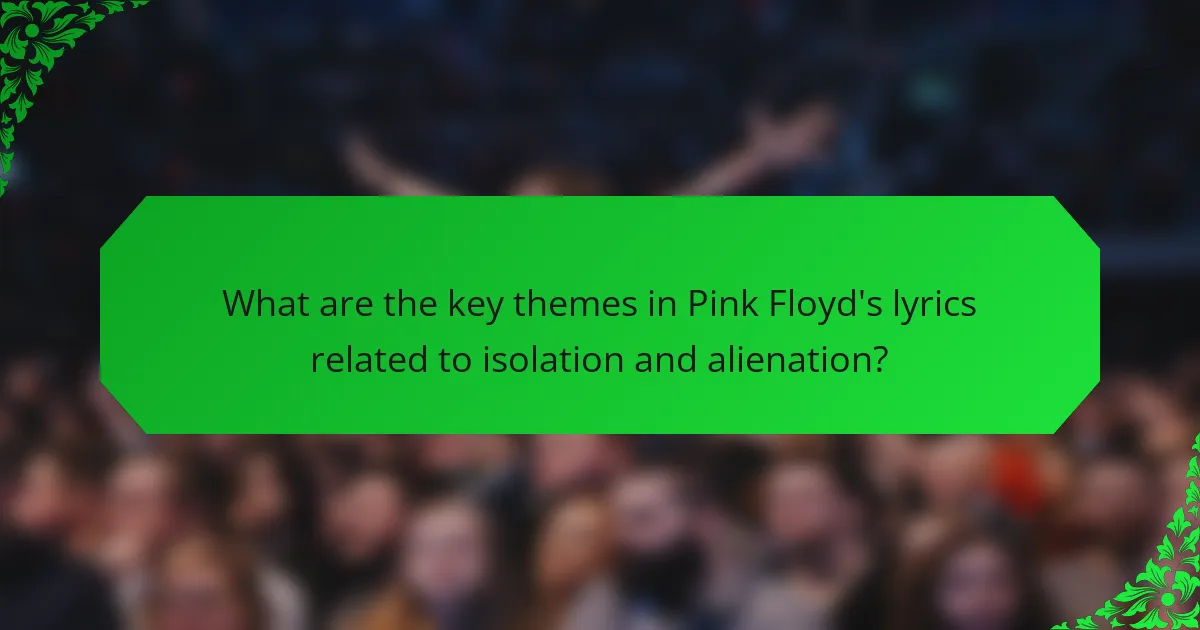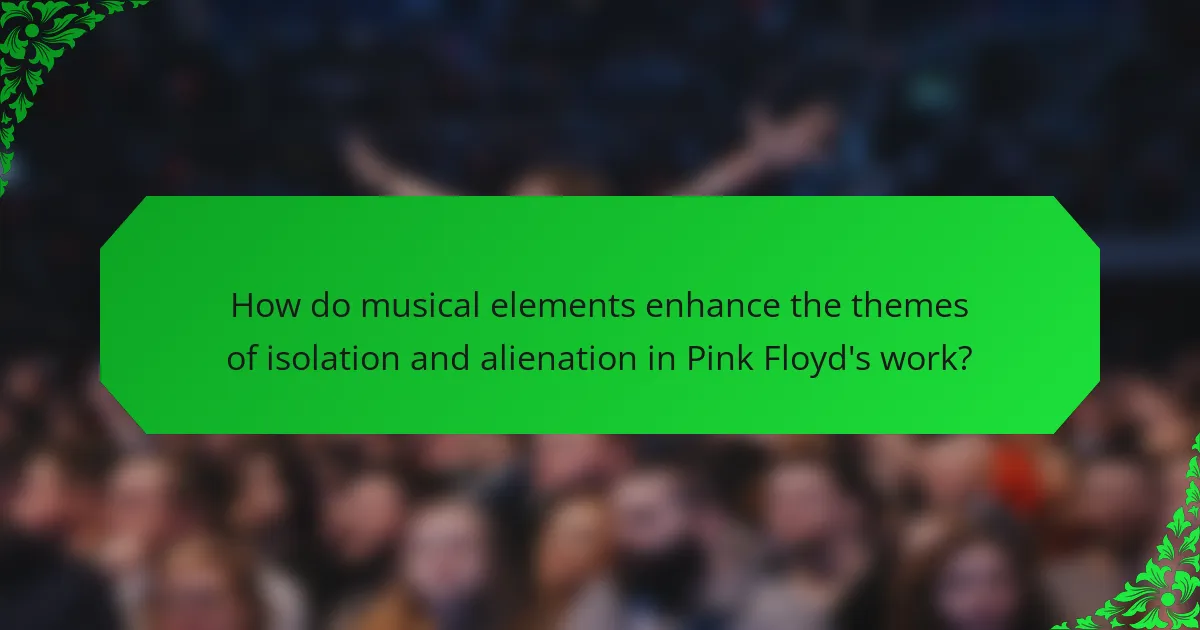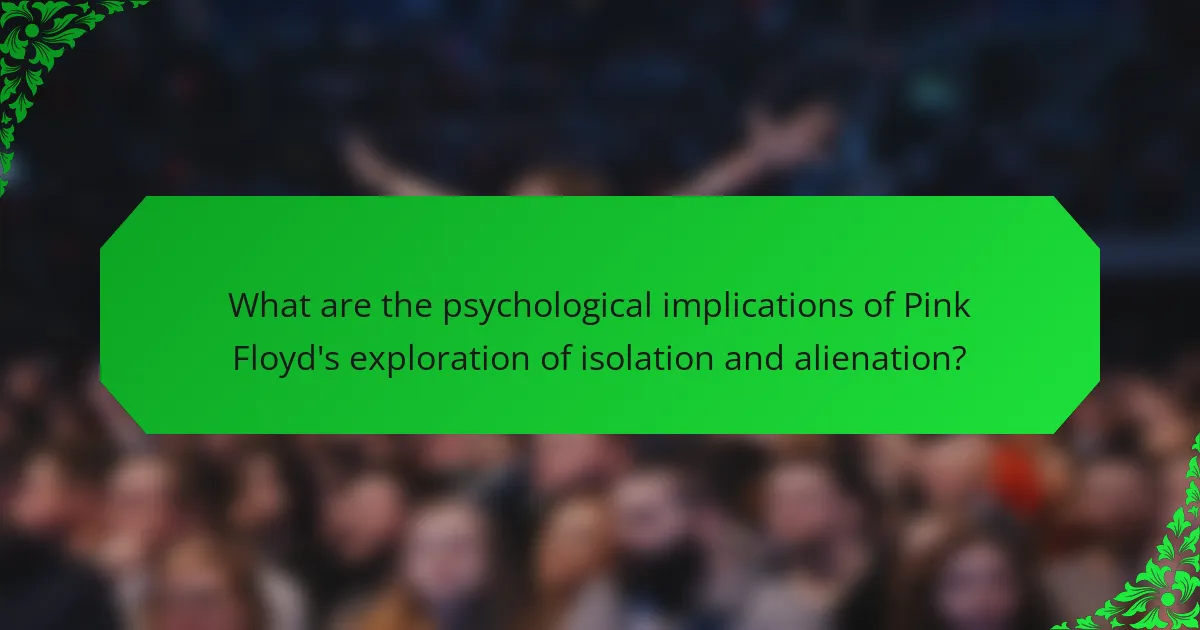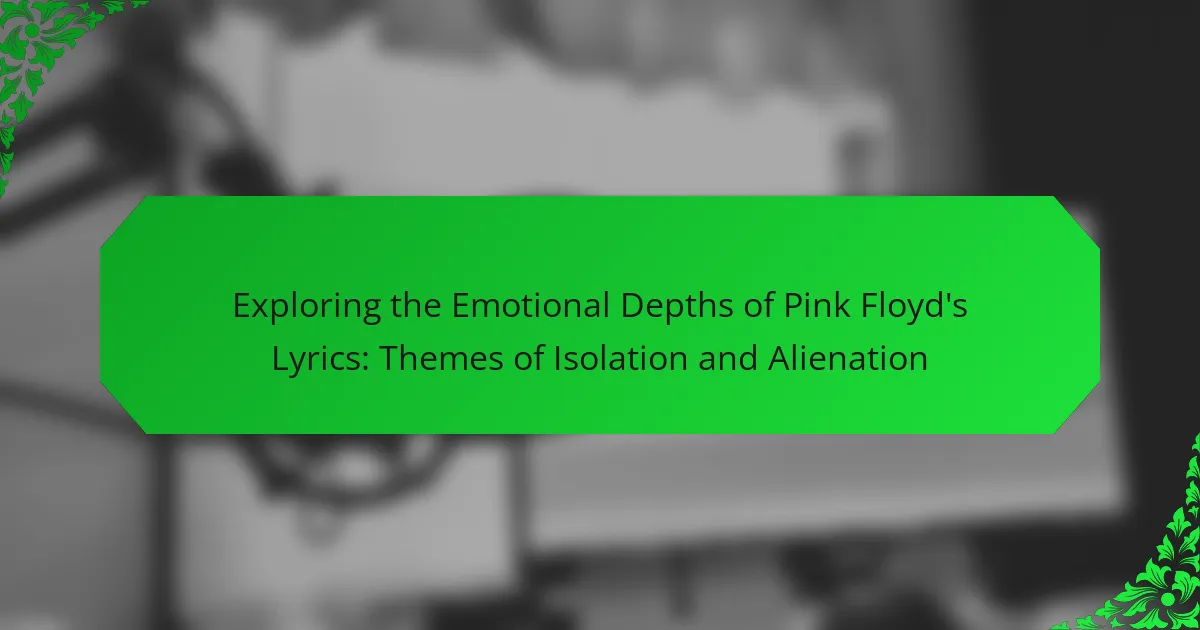Pink Floyd’s lyrics prominently explore themes of isolation and alienation, focusing on feelings of loneliness, disconnection, and existential despair. Key songs such as “Comfortably Numb” and “The Wall” illustrate emotional numbness and the barriers individuals create to protect themselves from pain. The band’s musical elements, including ambient soundscapes and haunting guitar solos, enhance these themes, creating a melancholic atmosphere that reflects inner turmoil. Additionally, Pink Floyd’s work addresses the psychological implications of societal pressures on personal relationships, encouraging introspection and dialogue about mental health. This article delves into the emotional depths of Pink Floyd’s lyrics, highlighting their resonance with listeners experiencing similar feelings of isolation.

What are the key themes in Pink Floyd’s lyrics related to isolation and alienation?
Key themes in Pink Floyd’s lyrics related to isolation and alienation include loneliness, disconnection, and existential despair. The band often explores the feeling of being trapped in one’s own mind. Songs like “Comfortably Numb” depict emotional numbness and the struggle to connect with reality. “The Wall” illustrates the barriers people build to shield themselves from pain. The lyrics convey a sense of longing for connection amidst overwhelming isolation. Themes of societal alienation are also present, reflecting the impact of modern life on personal relationships. Overall, Pink Floyd’s work resonates with listeners who experience similar feelings of isolation.
How do Pink Floyd’s lyrics reflect personal experiences of isolation?
Pink Floyd’s lyrics often reflect personal experiences of isolation through themes of alienation and emotional detachment. The song “Comfortably Numb” illustrates feelings of disconnection from reality and self. Lyrics describe a sense of numbness and being trapped in one’s own mind. “The Wall” conveys the idea of building barriers to protect oneself from pain and loneliness. The character Pink experiences profound isolation due to trauma and loss. “Wish You Were Here” expresses longing for connection and the pain of absence. These examples show how the band articulates complex feelings of solitude and the struggle for human connection.
What specific songs illustrate feelings of solitude?
“Comfortably Numb,” “Wish You Were Here,” and “The Final Cut” are specific songs by Pink Floyd that illustrate feelings of solitude. “Comfortably Numb” explores isolation through its lyrics about detachment and emotional numbness. “Wish You Were Here” expresses longing and absence, emphasizing the pain of separation. “The Final Cut” reflects on loss and alienation, presenting a somber view of personal and collective solitude. These songs convey deep emotional experiences related to being alone or feeling disconnected from others.
How do these songs convey the emotional weight of isolation?
These songs convey the emotional weight of isolation through haunting melodies and introspective lyrics. The lyrics often depict feelings of loneliness and disconnection from others. For example, “Comfortably Numb” illustrates a sense of detachment from reality. The use of imagery evokes a deep sense of despair and alienation. Additionally, musical elements such as slow tempos and minor keys enhance the feeling of isolation. The overall soundscape creates an immersive experience that resonates with listeners. This combination of lyrical content and musical composition effectively communicates the profound impact of isolation.
In what ways do societal influences manifest in Pink Floyd’s themes?
Societal influences manifest in Pink Floyd’s themes through critiques of authority and commentary on mental health. The band’s lyrics often reflect disillusionment with government and societal structures. For instance, “Another Brick in the Wall” critiques the education system as oppressive. Additionally, themes of alienation are evident in “Wish You Were Here,” addressing the loss of connection in modern society. The band’s experiences during the 1960s counterculture movement also shaped their perspective on societal norms. Their music often highlights the impact of war, consumerism, and isolation on the human psyche. Pink Floyd’s exploration of these issues resonates with listeners, making their themes universally relevant.
What cultural events or movements inspired these themes?
The themes of isolation and alienation in Pink Floyd’s lyrics were inspired by several cultural events and movements. The counterculture movement of the 1960s significantly influenced their music. This era was marked by widespread social upheaval and a quest for personal freedom. The Vietnam War also contributed to feelings of disconnection and despair among the youth. Additionally, the rise of mental health awareness during the 1970s shaped the band’s exploration of psychological themes. The industrialization and commercialization of society further fueled feelings of alienation. These cultural contexts provided a backdrop for Pink Floyd’s poignant reflections on human experience.
How do external societal pressures contribute to feelings of alienation in the lyrics?
External societal pressures lead to feelings of alienation in the lyrics by highlighting disconnection from societal norms. The lyrics often reflect the struggle against conformity and societal expectations. This struggle creates a sense of isolation as individuals feel pressured to fit in. For instance, themes of mental health and existential dread are prevalent in Pink Floyd’s work. The song “Another Brick in the Wall” illustrates how rigid educational systems contribute to a sense of alienation. The line “We don’t need no education” signifies a rebellion against societal constraints. This rebellion amplifies feelings of being an outsider. Such pressures can exacerbate emotional distress and lead to a profound sense of loneliness.

How do musical elements enhance the themes of isolation and alienation in Pink Floyd’s work?
Musical elements in Pink Floyd’s work amplify themes of isolation and alienation through soundscapes, instrumentation, and vocal delivery. The use of ambient sound effects creates a sense of emptiness. This is evident in tracks like “Echoes,” where long instrumental passages evoke solitude. The choice of minor keys contributes to a melancholic atmosphere. Songs such as “Comfortably Numb” feature haunting guitar solos that reflect emotional detachment. Lyrical delivery often employs a detached tone, enhancing feelings of alienation. Additionally, the contrast between quiet, introspective sections and explosive crescendos mirrors inner turmoil. These elements collectively deepen the listener’s experience of isolation and alienation in Pink Floyd’s music.
What role does instrumentation play in conveying emotional depth?
Instrumentation plays a crucial role in conveying emotional depth in music. It enhances the emotional landscape of a piece, allowing listeners to connect on a deeper level. Different instruments evoke various feelings; for example, strings can create a sense of longing, while a powerful guitar solo can express anger or passion. In Pink Floyd’s work, the use of synthesizers adds layers of complexity, reflecting themes of isolation. The band often employs dynamics and texture in instrumentation to mirror the emotional intensity of their lyrics. Historical examples include “The Great Gig in the Sky,” where the vocal instrumentation conveys profound sorrow and yearning. Overall, instrumentation shapes the listener’s emotional experience, reinforcing the narrative conveyed through lyrics.
How do specific instruments contribute to the mood of the songs?
Specific instruments significantly contribute to the mood of songs by shaping the emotional landscape through their unique sounds. For example, the use of the electric guitar in Pink Floyd’s music often evokes feelings of longing and melancholy. The soaring solos create a sense of yearning, enhancing themes of isolation. Similarly, synthesizers introduce atmospheric textures that can feel haunting or ethereal, reinforcing feelings of alienation. The piano adds a layer of introspection, often accompanying reflective lyrics. Percussion can drive the intensity of a song, altering the emotional pace. In Pink Floyd’s “Wish You Were Here,” the acoustic guitar sets a nostalgic tone, amplifying the song’s themes of absence. Each instrument’s timbre and dynamics play a crucial role in conveying the intended emotional response.
What techniques do Pink Floyd use to evoke feelings of loneliness in their music?
Pink Floyd uses several techniques to evoke feelings of loneliness in their music. They employ atmospheric soundscapes that create a sense of isolation. The use of reverb and echo effects enhances the feeling of distance. Lyrically, their songs often explore themes of alienation and despair. For instance, “Comfortably Numb” reflects the disconnection from reality. Instrumentation plays a crucial role; the haunting guitar solos contribute to the melancholic mood. Additionally, their use of silence and pauses accentuates the emotional weight of loneliness. Overall, these techniques combine to create a profound sense of solitude in their music.
How do vocal performances affect the interpretation of isolation in the lyrics?
Vocal performances significantly influence the interpretation of isolation in lyrics. The emotional tone conveyed through vocal delivery shapes listener perception. For example, a haunting, subdued vocal style can amplify feelings of loneliness. In contrast, a powerful, strained delivery may evoke desperation or urgency. Pink Floyd’s use of varied vocal techniques enhances the themes of isolation. Roger Waters often employs a raw, vulnerable vocal approach that resonates deeply with the audience. This technique allows listeners to connect personally with the lyrics’ themes. The combination of vocal inflection and lyrical content creates a profound emotional impact. Thus, vocal performances are crucial in interpreting the nuances of isolation in music.
What styles of singing are employed to express emotional distress?
Styles of singing that express emotional distress include falsetto, raspy vocals, and dissonant harmonies. Falsetto often conveys vulnerability and fragility. Raspy vocals can reflect pain and raw emotion. Dissonant harmonies create tension and discomfort, enhancing feelings of distress. These techniques are prevalent in various genres, including rock and blues. Pink Floyd frequently employed these styles to evoke emotional responses. Their use of vocal techniques aligns with themes of isolation and alienation in their lyrics.
How does the use of harmonies and backing vocals impact the listener’s experience?
The use of harmonies and backing vocals enhances the listener’s experience by creating emotional depth and richness in the music. Harmonies add layers that evoke feelings of nostalgia and longing. Backing vocals can provide a sense of support and companionship, reflecting themes of isolation and alienation. Research shows that harmonies can trigger emotional responses in listeners, making the music more impactful. For example, Pink Floyd often employs these techniques to amplify the emotional weight of their lyrics. This combination fosters a deeper connection between the listener and the music, enhancing overall engagement.

What are the psychological implications of Pink Floyd’s exploration of isolation and alienation?
Pink Floyd’s exploration of isolation and alienation reflects significant psychological implications. Their music often portrays feelings of disconnection and despair. This resonates with listeners who experience similar emotions. The themes can lead to increased awareness of mental health issues. Songs like “Comfortably Numb” illustrate the struggle between reality and emotional numbness. This highlights the impact of societal pressures on individual psyche. Research indicates that music can serve as a therapeutic tool for processing emotions. Pink Floyd’s work encourages introspection and dialogue about mental health. Overall, their exploration fosters a deeper understanding of human experiences related to isolation.
How do the themes resonate with listeners on a personal level?
The themes of isolation and alienation in Pink Floyd’s lyrics resonate deeply with listeners on a personal level. These themes reflect universal feelings of loneliness and disconnection. Many listeners relate to the emotional struggles depicted in the songs. The lyrics often articulate experiences that individuals face in their own lives. This connection fosters a sense of understanding and empathy among fans. Studies indicate that music can evoke strong emotional responses. For example, research by Blood and Zatorre (2001) shows that music activates brain regions associated with emotions. Pink Floyd’s exploration of these themes allows listeners to confront their own feelings. The band’s ability to articulate complex emotions enhances this personal resonance.
What psychological theories can be applied to understand the impact of these themes?
Psychological theories that can be applied to understand the impact of isolation and alienation themes in Pink Floyd’s lyrics include existential psychology, social identity theory, and attachment theory. Existential psychology explores the meaning of existence and the feelings of isolation that arise from it. This theory highlights how individuals confront their own existence and search for purpose, which resonates in Pink Floyd’s themes. Social identity theory examines how individuals derive a sense of self from group memberships. This can explain feelings of alienation when individuals feel disconnected from societal groups. Attachment theory focuses on the emotional bonds between individuals and how disruptions in these bonds can lead to feelings of isolation. Research supports these theories, showing that themes of isolation in music can evoke strong emotional responses and reflections on personal experiences.
In what ways do fans relate their own experiences to the lyrics?
Fans relate their own experiences to the lyrics by finding personal connections to themes of isolation and alienation. Many listeners interpret the lyrics as reflections of their own struggles with loneliness. For instance, the song “Comfortably Numb” resonates with individuals who have faced emotional detachment. Fans often share stories of how specific lines evoke memories of difficult times in their lives. This connection fosters a sense of community among fans who feel understood through the music. Research indicates that music can significantly impact emotional processing and self-reflection. Studies show that people often use lyrics to articulate feelings they may struggle to express otherwise. This shared experience enhances the emotional depth of Pink Floyd’s music for many fans.
What can we learn from Pink Floyd’s approach to discussing isolation and alienation?
Pink Floyd’s approach to discussing isolation and alienation reveals deep emotional insights. Their lyrics often reflect personal and societal disconnection. For example, in “The Wall,” the protagonist experiences profound isolation due to trauma. This narrative illustrates how alienation can stem from both personal experiences and external societal pressures. The band’s use of haunting melodies enhances the emotional weight of their themes. Additionally, their album “Wish You Were Here” poignantly addresses feelings of absence and longing. This demonstrates the universal nature of isolation. Through their music, Pink Floyd encourages listeners to confront and understand their own feelings of alienation. Their work serves as a powerful commentary on the human condition.
How can their music provide comfort or catharsis for individuals experiencing similar feelings?
Pink Floyd’s music can provide comfort and catharsis through its exploration of deep emotional themes. The band’s lyrics often resonate with feelings of isolation and alienation. This connection allows listeners to feel understood and less alone in their experiences. For example, songs like “Comfortably Numb” address feelings of detachment and pain. The haunting melodies and poignant lyrics create a safe space for reflection. Research indicates that music can evoke strong emotional responses, providing an outlet for processing feelings. Listening to such music can lead to emotional release and healing. Pink Floyd’s work exemplifies how art can mirror personal struggles, fostering a sense of community among fans.
What insights can be gained for addressing themes of isolation in modern music?
Themes of isolation in modern music reveal deep emotional connections and societal reflections. Artists often express personal experiences of loneliness and disconnection. For example, Pink Floyd’s “The Wall” explores alienation through its narrative. This album illustrates how isolation affects mental health and relationships. Additionally, studies show that music can serve as a coping mechanism for listeners feeling isolated. Research indicates that engaging with music can foster a sense of belonging. By addressing these themes, artists can resonate with audiences facing similar struggles. Thus, modern music acts as both a mirror and a balm for feelings of isolation.
The main entity of the article is Pink Floyd, a renowned rock band known for their profound lyrics. The article explores key themes in Pink Floyd’s lyrics related to isolation and alienation, highlighting feelings of loneliness, disconnection, and existential despair. It examines specific songs such as “Comfortably Numb,” “Wish You Were Here,” and “The Wall,” illustrating how the band’s musical elements and lyrical content convey emotional depth. Additionally, the article discusses the societal influences and psychological implications of these themes, detailing how they resonate with listeners on a personal level and provide insights into addressing feelings of isolation in modern music.
